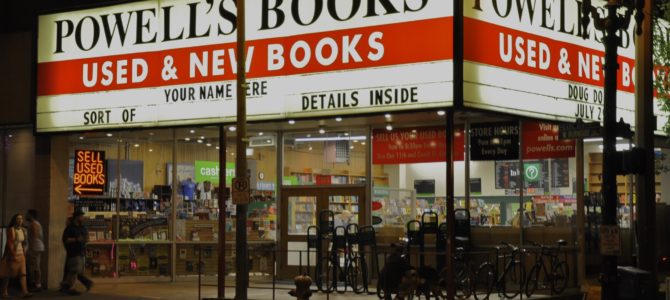
After refusing to carry a conservative journalist’s book in its store, one of the largest bookstores in the world is asking customers to “celebrate Banned Books Week.”
On Sept. 26 I got an email from Powell’s Books, headlined “Celebrate Banned Books Week!” Near the slogan “Books Unite Us, Censorship Divides Us,” I saw photos of books that seem to be challenged again and again by various school districts, public libraries, and even some commercial bookstores: Ray Bradbury’s “Fahrenheit 451,” Kurt Vonnegut’s “Slaughterhouse-Five,” James Joyce’s “Ulysses,” Harper Lee’s “To Kill a Mockingbird,” Margaret Atwood’s “The Handmaid’s Tale,” and more of the usual suspects.
It’s quite the change of tune for Powell’s, which announced back in January that it would not carry the book “Unmasked: Inside Antifa’s Radical Plan to Destroy Democracy” by conservative journalist Andy Ngo in its store.
Why Won’t Powell’s Sell Andy Ngo’s Book In Stores?
Ngo is much reviled by leftwingers in Portland for exposing the violent tactics of the movement known as “Antifa.” Ngo was born and raised in Portland. His parents were Vietnamese boat people who fled to America after the chaotic end of the Vietnam War.
You would think a bookstore headquartered in Portland would want to celebrate a local writer, especially one whose life has exemplified how foreign immigrants and their American-born children help add to the American cultural mosaic. But such is not the case for Ngo. He is a conservative in a far-left city.
So, on its Twitter account, Powell’s announced that “Unmasked by Andy Ngo came to us through an automatic data feed through one of our longtime partners, Hachette Book Group. This book will not be placed on our shelves. We will not promote it.”
This book will not be placed on our shelves. We will not promote it. That said, it will remain in our online catalog. We carry a lot of books we find abhorrent, as well as those that we treasure. (2 of 3)
— Powell's Books (@Powells) January 11, 2021
Powell’s does sell “Unmasked” through its online portal (where, the company noted in its tweet, “we carry a lot of books we find abhorrent”). Still, refusing to stock a book because of the objections of an extremist political group that is known to occasionally use violence to achieve its aims seems like the height of corporate cowardice.
On Sept. 27, the day after Powell’s sent out the email promoting its opposition to banning books, “Unmasked” was listed number two on Amazon’s list of bestselling books on local politics, number four in radical political thought, and, ironically, number 37 among books on censorship and politics. The fact that nearly 5,000 readers have posted reviews of the book on Amazon, 97 percent of which have been positive, suggests there is a huge demand for the book. But for some reason, Powell’s didn’t think to mention it in its annual email celebrating Banned Books Week.
‘Banned Books Week’ Only Celebrates the Narrative
Back in the 1990s, I worked at a Tower Books store in Citrus Heights, California. The chain embraced a very libertarian aesthetic for bookselling, and we carried a lot of books and magazines that people in the community didn’t like. Parents occasionally complained that they didn’t like bringing their children into the store because we carried High Times (a pro-marijuana magazine) and various skin mags.
One of the most controversial items we carried was “The Anarchist Cookbook,” a bomb-making manual published back in 1971. Eventually, we kept all copies of the book behind the counter. We did this not in order to deter sales of the book but to deter theft of the book. Anarchists, it seems, would prefer to steal books instead of pay for them: copies of the book were always disappearing when we kept them out on the shelves.
There was a time Banned Books Week was a nonpartisan celebration of edgy books and bold librarians. Those days are gone. Now it is a celebration of a one-sided political narrative. It is a chance for leftists and practitioners of woke capitalism to pat themselves on the back for having resisted the complaints of conservative parents about books such as Susan Kuklin’s “Beyond Magenta: Transgender Teens Speak Out,” Carolyn Mackler’s “The Earth, My Butt, and Other Big Round Things,” and David Levithan’s “Boy Meets Boy.”
Ironically, one of the books listed on Powell’s Books’ display of banned titles is “The Lorax” by Dr. Seuss, which some conservative parents believe is anti-logging and anti-capitalist, because it contains a pro-environment message. “The Lorax” has indeed been subject to a few feeble parental protests through the years. Yet, unlike other Dr. Seuss classics like “And to Think That I Saw It On Mulberry Street,” it remains in print and easy to obtain.
Retirement seems a long way off for “The Lorax.” And that’s a good thing. But its message should be taken to heart by everyone in America who loves books and hates censorship:
Unless someone like you cares a whole awful lot
Nothing is going to get better. It’s not.









